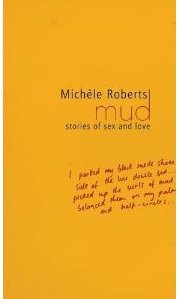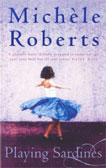
Photo by Kim Karmark
Article by Amanda McAleese
Michèle Roberts’ stories are generous and quirky, adventurous and erotic. She writes about things I want to read, moving between France and England, between past and present. The stories are full of sensuality, religious feeling and women’s desires. They are subversive and witty. She combines fantasy, myth and feminism.
In her story ‘Emma Bovary’s Ghost’, Roberts says: ‘Stories are hard to get a hold on. They change like shadows on a day of sun and wind. They flicker like candles in draughts in the evening. If you don’t pay them enough attention they dwindle and die, black wicks smoking above puddles of wax’ (Mud, p 37).
Roberts has published fourteen novels, three collections of poetry, a play and two works of non-fiction. Currently, she has three books of short stories on the shelves: Mud (Virago 2010), Playing Sardines (Virago 2001) and During Mother’s Absence (Virago 1993). Her novel Flesh and Blood is also comprised of short stories, cut in half.
 Roberts was born in Bushey in Hertfordshire in 1949 to a French Catholic mother and an English Protestant father, and later attended Somerville, Oxford, an all-women’s college. Her novel Daughters of the House was shortlisted for the Booker in 1992 and won the WH Smith Literary Award in 1993. In 2000 she was awarded the Chevalier de l’Ordre des Arts et des Lettres by the French government. A year previously, she refused an OBE because she is a republican. She is also a Fellow of the Royal Society of Literature.
Roberts was born in Bushey in Hertfordshire in 1949 to a French Catholic mother and an English Protestant father, and later attended Somerville, Oxford, an all-women’s college. Her novel Daughters of the House was shortlisted for the Booker in 1992 and won the WH Smith Literary Award in 1993. In 2000 she was awarded the Chevalier de l’Ordre des Arts et des Lettres by the French government. A year previously, she refused an OBE because she is a republican. She is also a Fellow of the Royal Society of Literature.
On the blog she writes for Bookbite (as their Writer in Residence), Roberts explains that: ‘The first fiction I wrote was short stories, which stayed as close as possible to poems. I still think that the action of a story can take place at the level of the prose itself, at the level of image, as does the action of a poem’ ( April 2010).
I started my explorations of Roberts’ work with the most recently published of her short story collections, Mud. Three of the stories in this collection have been previously published, and earlier versions of four others have been broadcast on radio (Roberts re-wrote these stories for publication in this collection). On her blog, she writes in detail about her redrafting process, a process which she says centres on being honest with language so as to catch all of its meaning. She explains that stories can ‘be powered by the unconscious pulsing away beneath the surface of the prose, through what was not said but suggested, through what was omitted or distorted, through metaphors.’
redrafting process, a process which she says centres on being honest with language so as to catch all of its meaning. She explains that stories can ‘be powered by the unconscious pulsing away beneath the surface of the prose, through what was not said but suggested, through what was omitted or distorted, through metaphors.’
I heard her speak at Chawton in 2008 where her theme was the flaneuse, the literary loafer listening to conversations, noting details, getting inspiration from wandering around the city. She mentioned the prostitute whom Dr. Johnston and Boswell encounter on the Strand. What was that woman’s story? She talked of the difficulty of translating flaneur, especially in its female form: ‘streetwalker’ is the most accurate term. She was trying to reclaim streetwalker and declared that she was a flaneuse herself. Many of her stories reflect her wanderings in central London and Paris, looking for adventure.
I was delighted to find the story ‘Flaneuse’ (Mud, p 47) and recognize what Roberts must have been obsessed with at the time she spoke to us at Chawton. The main character in this story, Polly, moves between the eighteenth century and the twenty-first in her attempts to sort out her feelings for her lover. We learn that ‘She left pain no forwarding address. But pain, that smart detective, caught up with her pretty fast. Picked her heart’s lock, barged in, squatted, took possession’ (Mud, p 58).
Polly is a typical character in a Roberts story – a working woman, learning to cohabit with pain, struggling with her worth. Often her central characters are ordinary, like Giulia the doctor’s cousin who has the unsavory job of looking after George Sand when Sand has dysentery in Venice (‘Remembering George Sand’).
In ‘The Easter Egg Hunt’, Roberts shows us jealousy and how to deal with the devil. It disturbed and delighted me. This was the story I re-read and savoured. It refuses to leave me, still.
‘Annunciation’ is another story that haunts me. Roberts’ tale of Marie, Joe, Lizzie and the psychiatrist sent me back to read the Gospel of Luke. Marie sits, not taking part in an orgy, ‘in her blue tartan mini dress fiddling with the idea of the loss of God’ (Playing Sardines, p 159) . This tale of domestic violence smacked me in the face.
violence smacked me in the face.
Roberts is a modernist who tells us about the creative process. She says, ‘all my novels enact problem solving, pose questions of content and form and then try to answer them.’
Her stories are wonderfully funny and allusive. I learned about Mallarmé and how he overcame being ‘suddenly sick of writing mysterious and perfect sonnets’ (Playing Sardines, p 23), despite his truly wonderful life. Roberts goes on to discuss Mallarmé’s poem ‘A throw of the dice’ where ‘the patterns of dancing words evoke(ing) both chaos and the dawning of modernism, the creation of difficult beauty in the void left by God’s exile.’
That’s what I think Roberts’ stories are – ‘difficult beauty’ in a ‘void left by God’s exile.’ One story is a series of lists, another a glossary, two are subtitled ‘A novel in x chapters.’ Her range is breathtaking, her willingness to experiment with form, exhilarating.
In her story ‘The Miracle’ we learn that St. Anthony helps you find things you have lost. The public toilets outside his shrine in Padua are called the Cabinets of Decency, apparently. It was only when I typed this that I thought that Roberts was perhaps teasing me, but when I read the words back, my delight did not allow me to question the meaning any longer, especially as she included this truth: miracles are ‘… really about people’s love of story-telling, fitting old bits of your life into a pattern that you invented yourself, stringing them together into a narrative, making a shape that pleased you’ (Playing Sardines, p 161).
So Michèle Roberts says stories are miracles. Did I catch all the meaning?


I first became aware of Michele Roberts when I read her short story Une Glossaire/A Glossary in More Tales I Tell My Mother, a collection of “feminist short stories” which was published in 1987. The story took the form of a series of definitions of French words, alphabetically ordered. Sometimes these were short paragraphs describing things like butter and cream. On the subject of Brigitte, her aunt, the definition was extensive. The story struck me both for being experimental in form and for being so fiercely and unappologetically autobiographical.
Since then I’ve read Daughters of the House and encountered a few more of her short stories but I’m grateful to Amanda’s article for encouraging me to seek out more of Michele Roberts’ work, particularly her latest collection of short fiction.